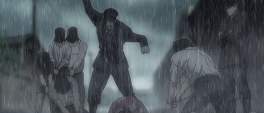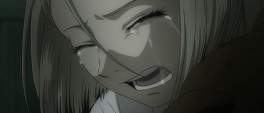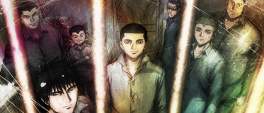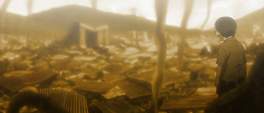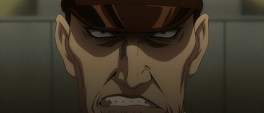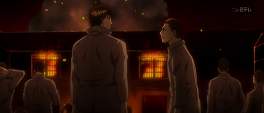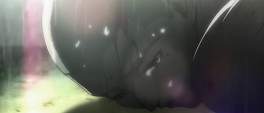A story of incarcerated juveniles trying to survive the horrors of a detention centre in a post-war Japan is not the most obvious or accessible material to construct a series from, but Rainbow Nisha Rokubou no Shichinin does exactly that. Who better then, than Madhouse to craft something thoroughly engrossing out of the dark and violent? With a mostly untested production staff as well, barring the art director from Aoi Bungaku. The thrash-metal opening may jar horrifically against the serene introduction, potentially turning away the indifferent or the apathetic, but a momentary persistence reveals a gripping tale of camaraderie against constant oppression and though the story of the first three episodes may cover some of the most grotesque acts people are capable of, it is a powerfully human story and difficult to turn away from.
Six masked adolescents are being transported to Shio reformatory, scorned by the populace and beaten by the guards, their punishment for their varying crimes already long begun. Violated and humiliated by the on-site doctor, all six are shown to their cell where a lone occupant, Rokurouta Sakuragi, awaits them. Their confrontational first meeting ends with Rokurouta uninjured and the others unceremoniously pummelled; what starts from there is a spirit of survival, each one enduring the constant beatings and malevolence perpetrated against them while coming to terms with their own pasts. One guard in particular seems to take a perverse, sadistic pleasure from thrashing the inmates - Rokurouta especially whom he bears a special grudge; his duplicitous tendencies threaten to splinter the group when their survival relies on their comradeship.
Megumi Hayashibara is the first voice heard in the series, her sultry narration one of a raft of impressive vocal talents who are let down by Romi Park whose high profile stint as Edward Elric from Fullmetal Alchemist and derivative work her means she is overbearing when restraint is called for. Females are thin on the ground though and a male dominated cast means that characters like Joe's sister Megu stand out, but are balanced by ones such as the orphanage director whose grimace and bloodshot eyes are the stuff of nightmares. Much of the opening three episodes are lost within that mindset: a hellish and baleful environment that makes one wonder at the usefulness of a penitentiary system, or how it would be possible to reintegrate and recover from such a harrowing experience. These are the questions the series sets out to explore, rather than treat the prison as the entirety of the protagonist's involvement, instead following them as they grow and evolve.
The opening, as discordant as it is, provides a clever look into both the future and the pasts of the seven boys. The grainy vignette style is carried forward into the episodes with mercifully brief flashbacks into several of the boy's pasts, providing context for their law breaking as well as their current personalities. It is also these flashbacks which explore the aftermath of the war, dealing with diverse topics that include the atomic bombing of Japan to the lack of food and the lengths to which many will go to obtain some. It is the questions and concepts that are posed which make the opening episodes such an enthralling experience, even more so than the main narrative which is robust and strong in itself. Coming from a manga author who grew up during the second world war and has won awards for this, his only publication, the series feels gruesomely authentic and provides a voyeuristic glimpse into a time that demands to be remembered rather than avoided.
The remainder of Rainbow Nisha Rokubou no Shichinin promises to be just as diverse as the beginning, the pathos demonstrated so far is sure to make the seven boy's development into men its greatest triumph. The series touches upon an era that few have dared to explore and it does so with a brutal sensitivity that is befitting of its seriousness. At times it can be uncomfortable viewing - a boon that the animation, as accomplished and detailed as it is, doesn't display the full plethora of bruises and wounds the boys have had inflicted upon them. With a budget the Madhouse are able to flex their talents with and a source that consistently delivers brilliance, the series so far is challenging but rewarding and is at no point less than captivating.

